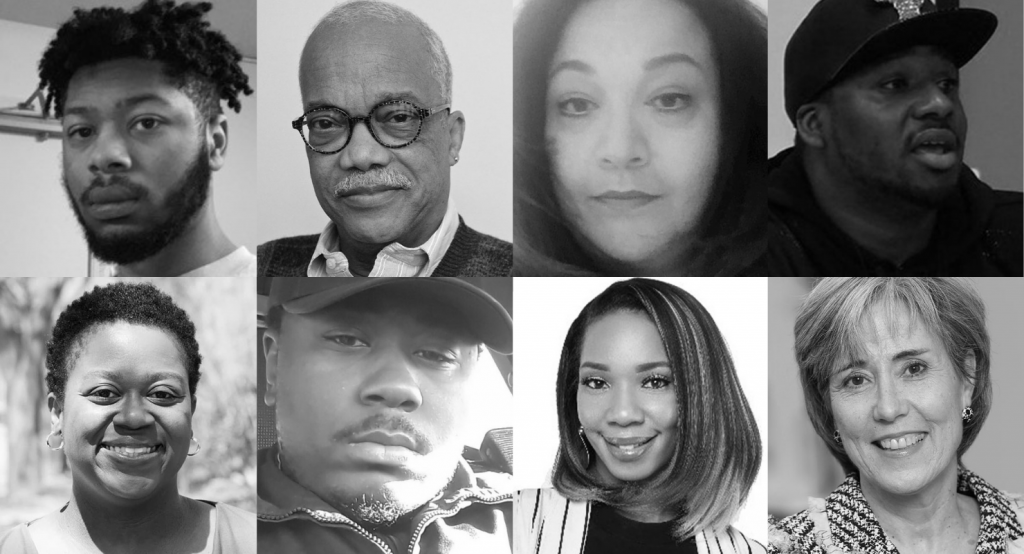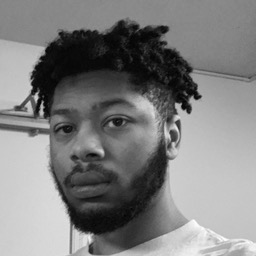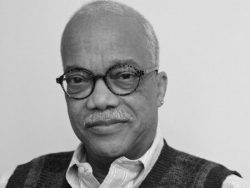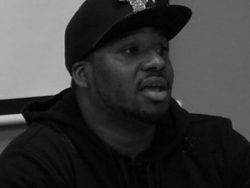One Year After George Floyd’s Death
Milwaukeeans reflect on how things have changed — or haven’t.
It’s been a year since George Floyd’s death and the resulting protests. The outrage and pain that spilled into the streets were accompanied by calls for change and an end to systemic racism.
So what change has taken hold and what work remains to be done? That’s the question we asked residents, and here’s they said.
‘If history is useful, I remain skeptical’
Malik Pitchford, a Milwaukee native, studies political science and African and Black diaspora studies at DePaul University.
Over the past year, many held cautious but optimistic outlooks for the future. In June 2020, people around the country found themselves out in the streets in the midst of a pandemic, protesting against policing and the violence police can bring into communities. The burning of a Minneapolis precinct, symptomatic of a people pushed to the edge, served as imagery for feelings felt by those across the United States, and eventually people across the world.
Optimism emerged at this period, but it would not stay for long. Calls for abolishing the police (by the people protesting in the streets every day, also subject to police violence) would eventually give way to calls for defunding the police, then circling back to tired lines of police reform, and finally, grinding down to a stale call to “vote!”
Supporters from afar opted to throw money anywhere and to any organization that claimed they stood for Black lives. In fact, many organizations found this time period a perfect one to consider their own place in a society marked with a racist past and present. This, while politicians swooped in to give their own takes on the state of uprisings in America.
Police reforms have been suggested and implemented as far back as I can remember, yet none of these reforms seem to prevent the need for protest. We are to believe that Joe Biden—this time around—will usher in the reforms needed to solve the problems Black people have had in America for centuries. Maybe he will. But if history is useful, I remain skeptical.
I am not more pessimistic than last year, however. I still have great faith in the power of community. That is where the real spark for change is, even if some think of electoral politics as the sole mechanism for political change. I am optimistic that if (or when) electoral politics shows itself futile in creating that meaningful change, our communities will continue to step up and be the change needed to secure better lives.
‘We are not free to abandon our striving for justice’
William R. Tisdale is the president and CEO of the Metropolitan Milwaukee Fair Housing Council.
In the tumultuous year since the murder of George Floyd, we have re-learned several lessons that come up over and over again in the struggle for justice.
First, we’ve been shown again that the work for justice can take many paths. Grassroots organizing, individual volunteering, direct protest, electoral political efforts, legal action and community-building are all valuable ways that we can express the need for justice and make change.
Second, without question, we see once again that elections matter. It is understandable that many people feel disillusioned with political parties and the power of elected officials to create real change, but it’s also very clear that the current presidential administration has taken steps to advance civil rights in ways that will be meaningful for millions of people. For example, early this year, the Biden administration’s Department of Housing and Urban Development announced that it will enforce the provisions of the federal Fair Housing Act that prohibit discrimination based on sex to include protections based on gender identity and sexual orientation. This is groundbreaking: for the first time, LGBTQ+ people will be protected from housing discrimination by the most powerful, widely applicable federal fair housing law.
The road to justice is lifelong and requires a commitment beyond the horizon of our understanding. In the oft-quoted words of the Talmud, “Do not be daunted by the enormity of the world’s grief. Do justly now, love mercy now, walk humbly now. You are not obligated to complete the work, but neither are you free to abandon it.”
We are not free to abandon our striving for justice. Not today, not a year from now, not ever.
‘It shouldn’t take an incident such as Floyd’s death to “wake up” law enforcement’
Hobe Love is an auxiliary officer with the Milwaukee Police Department.
Since George Floyd’s death, I have seen some good progress within our state as far as law enforcement goes.
Has the progress been what I hoped for? No.
Sadly, it shouldn’t take an incident such as Floyd’s death to “wake up” law enforcement to realize what has been a trend in our profession.
However, what I can say is that within our state we are now bringing the George Floyd incident into our interviewing process when it comes to applicants applying to become police officers. Those applicants having knowledge on the incident and sharing their thoughts during the interviewing stage is now becoming a helping tool for agencies to decide if they want to potentially hire the applicant.
Also, within the state test that police officers take while in the academy, topics such as crisis management has increased. After George Floyd, these topics are more relevant in becoming a police officer.
As far as what’s the most crucial work that remains? For me, I would say getting police officers on the same page. The fact that there are police officers who find nothing wrong with Derek Chauvin’s actions involving George Floyd tells me there is still a lot of work to be done from inside the law enforcement profession.
‘We have accomplished a lot, but those accomplishments are under direct fire’
Vaun Mayes is a social justice and civil rights activist in Milwaukee and the co-founder of Program the Parks MKE.
In the George Floyd era, we have accomplished a lot, but those accomplishments are under direct fire.
For example, we got rid of an ineffective and detrimental police chief, but now, a judge is trying to help him force his way back onto the force if the city does not pay him lawsuit fees on a forced timeline. I didn’t know this was even possible.
We also have Wisconsin lawmakers writing bills that directly and negatively impact the people and city of Milwaukee. This includes legislation meddling in the affairs of how our Fire and Police Commission is run, trying to give police unions the power to submit approved names on what is supposed to be a community oversight board; pushing to put police in neighborhood “cop houses” when we have strained levels of trust and transparency with law enforcement that have not been fully addressed; and even threatening laws that enable them to “defund Milwaukee” if Milwaukee defunds law enforcement.
And all this from Republicans who are predominantly white males who do not represent Milwaukee, its people or its interests. I don’t understand how a party that has historically denounced, opposed and even flat out denied the issues that people of color have championed can take the front seat in the conversation on what changes we need.
The movement has been hijacked and undermined, and we will not allow almost a year of marches, action and activism to go in vain.
‘George Floyd should be alive today. His legacy is now ours to keep through our actions’
Ellen Gilligan is the president and CEO of the Greater Milwaukee Foundation.
George Floyd should be alive today. Instead, we are remembering a year gone by without him and left to reflect on how we can better build on the movement his death ignited while honoring his life through real community change.
Our work together depends on us addressing the root causes of the injustice we see. Violent policing tactics cannot be viewed in isolation. Housing discrimination, disparities in access to jobs, health care, quality education – these are all connected through centuries-old beliefs and behaviors codified as practices and policies designed to preserve a hierarchy that prioritizes white safety and prosperity over all others.
As long as racism is embedded in the systems that devalued George Floyd’s life, those systems will continue to produce inequities, including here at home. Without racial equity, our region fails to benefit from the creativity, productivity and experiences of all people.
You might be able to compose a song on a guitar with a missing string, but it will lack proper melody. You might be able to drive a car with one malfunctioning cylinder, but you will lose power and risk long-term damage. You could build a house without shingles, but eventually, the roof will collapse. This is what systemic racism does to a community. It steals our harmony, our effectiveness, our well-being and our potential.
During the last year, the foundation has accelerated work aimed at making systems in our community more equitable. We are investing in access to high-quality early childhood education so all children, and especially Black and brown children, receive the foundational learning and healthy start in life they need. We are expanding equitable economic opportunity in multiple ways, including investments in the stability and growth of entrepreneurs and small businesses, particularly in communities of color. We are collaborating with other funders, nonprofits and the public sector to increase access to desirable, affordable housing to close homeownership gaps and prevent evictions.
Most important, we are doing this work together, with the perspectives and priorities of the community at the center of our decision-making. We are dreaming big about change, and it will take all of us to see it through. Despite the challenges before us, I feel increasingly hopeful about the future as more people join us in partnership, investment and advocacy.
George Floyd should be alive today. His legacy is now ours to keep through our actions.
‘What offers me hope is our young people’
Bevin Christie is a Sherman Park resident.
In the past year, I’ve seen a lot of performative behavior. It’s as though diversity, equity and inclusion work is now the cool thing to do, not the humane thing to do. I’ve seen more job postings for directors of diversity and inclusion than ever before. People are scrambling to diversify their boards of directors, their talent pipelines, but who is making sure the workplace or organization is a welcoming environment for that diverse talent pipeline?
I’m not seeing the heavy lifting, so to speak.
We need healing, which requires us to take a hard look at ourselves and our roles in this racist society. We need forgiving ourselves and each other as we move through this process. Unfortunately, we still have a large percentage of the population who are in denial and do not wish to acknowledge this country’s racist past, its effects on our communities, and do not wish to work toward healing for a brighter future.
I try to remain positive, but I am also very realistic. This is a movement for equity and inclusion — there is not a school, nonprofit, corporation, government agency or household in this country that does not need to work on being more equitable, inclusive, and kind, but not everyone sees it as their responsibility to make this country whole.
What offers me hope is our young people. I see some great leaders emerging here in Milwaukee and nationally. They have worked tirelessly prior to 2020 and only stepped up their game this past year. I hope we start to listen to them and learn from them as they not only fight for justice but redefine what justice looks like in this country.
‘Racial justice does not just affect one area, it encompasses all areas’
Nakisha Adams is an author and CEO of Skribble.
In the past year, there have been some notable policy changes in certain parts of the country. However, I expected to see more progress toward racial justice and reform. While some of the aforementioned changes are steps in the right direction, there is still a long road ahead. More needs to be done to reform a system that is deeply entrenched in systematic racism.
There have to be investments made in communities in the areas of education, affordable housing and mental health services. This is what investing in safety beyond policing looks like. These components are all important to building strong and safer neighborhoods.
We also have to continue to eliminate racial disparities across the justice system, especially practices that specifically target communities of color. There must also be continuous efforts to remove barriers from individuals affected by the justice system, by investing in re-entry services, restoring individuals’ rights to vote, and not silencing the voices of these individuals whose firsthand experiences with the justice system are invaluable to the conversation around reform.
I do feel more optimistic than a year ago because there has been notable achievement. We must continue to address policies at the local, state and federal level, because racial justice does not just affect one area, it encompasses all areas.
‘Now that the world is getting back to “normal,” will the fight for justice remain?”
Marquayla Ellison is the president of Social X and Tenia Fisher is the director of health and wellness of Social X.
George Floyd’s death caused an uproar in our community that forced us to no longer be silent. Unfortunately, more Black and brown people are continuing to be murdered at the hands of police. This makes it clear that there is still critical work to be done.
In order to make progress, everyone should be able to be their true selves in any space and feel safe. Creating safe spaces starts with the transformation of the police department. We need to ensure that police are a part of our community and their main goal is to keep EVERYONE safe. This action can’t be placed solely on the police. The responsibility lies with training that the police receive. Lastly, building trust between police and Black and brown people is a must. The trust was never established and it’s time to start making a true effort to obtain it.
Although I would love to say I am more optimistic than a year ago, my feelings remain the same. George Floyd was murdered during a pandemic while the whole world was on pause and had no other choice but to react. Now that the world is getting back to “normal,” will the fight for justice remain? With the George Floyd Act still sitting in Senate, when will the words turn into action?
This story was originally published by Milwaukee Neighborhood News Service, where you can find other stories reporting on fifteen city neighborhoods in Milwaukee.
More about the 2020 Racial Justice Protests
- Plea Agreement Reached On Long-Pending Sherman Park Unrest Charges Involving Vaun Mayes - Jeramey Jannene - Oct 17th, 2024
- Rep. Ryan Clancy Settles With City Following 2020 Curfew Arrest - Jeramey Jannene - Dec 12th, 2023
- Supervisor Clancy Applauds Settlement in Clancy vs. City of Milwaukee - State Rep. Ryan Clancy - Dec 12th, 2023
- Tosa Protest Assails Federal Court Decision Exonerating Police - Isiah Holmes - May 9th, 2023
- Wauwatosa ‘Target List’ Trial Begins - Isiah Holmes - May 3rd, 2023
- Shorewood Spitter Found Guilty For 2020 Protest Confrontation - Jeramey Jannene - Apr 20th, 2023
- City Hall: City Will Pay 2020 George Floyd Protester $270,000 - Jeramey Jannene - Feb 14th, 2023
- Tosa Protest Tickets Dismissed - Isiah Holmes - Jul 21st, 2022
- Op Ed: ‘We Need More’ - Charles Q. Sullivan - Mar 4th, 2022
- Milwaukee Officers Circulate “2020 Riot” Coins? - Isiah Holmes - Nov 14th, 2021
Read more about 2020 Racial Justice Protests here





























